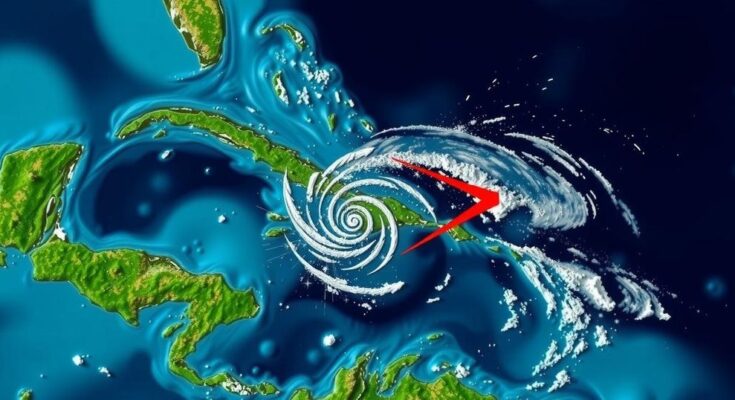Tropical Storm Oscar is moving towards the Bahamas after impacting Cuba as a Category 1 hurricane, leading to at least six deaths. Forecasts predict heavy rainfall across the southeastern Bahamas. Oscar is noted as the smallest recorded hurricane, provoking discussions around forecasting failures. Meanwhile, the Atlantic hurricane season is anticipated to be above average due to warm ocean temperatures.
Tropical Storm Oscar advanced towards the Bahamas on Tuesday, having made landfall in Cuba as a Category 1 hurricane. Reports indicate that the storm caused at least six fatalities while unleashing severe rainfall on the island, which is concurrently grappling with a significant power outage. On Tuesday morning, Oscar was positioned 45 miles (75 kilometers) south-southeast of Long Island in the Bahamas, with recorded winds of 40 mph (65 kph) and a movement trajectory of north-northeast at 12 mph (19 kph), as reported by the National Hurricane Center in Miami. Currently, the National Hurricane Center indicated that, “Oscar is at best barely a tropical storm at this time.” The storm is anticipated to deliver up to 5 inches (13 centimeters) of rain across parts of the southeastern Bahamas, with potential isolated accumulations of 8 inches (20 centimeters). A tropical storm warning remains in effect in the central and southeastern region of the Bahamas. Notably, Oscar has set a historical precedent as the smallest hurricane ever recorded, with a wind field spanning merely about 6 miles (10 kilometers). Its landfall took many by surprise, occurring first on Grand Inagua Island in the Bahamas on Saturday, followed by a secondary landfall in eastern Cuba late Sunday. Michael Lowry, a hurricane specialist and storm surge expert, remarked in an analysis that, “It’s not often we see a colossal failure in hurricane forecasting,” highlighting that no forecasting models had indicated the potential for Oscar to strengthen into a hurricane. In Cuba, the storm precipitated significant rainfall, with certain areas recording over 15 inches (38 centimeters) on Monday. Forecasters have issued warnings regarding the likelihood of severe flooding and potential landslides, particularly in Guantánamo, which witnessed the reported fatalities. This disaster coincides with ongoing efforts in Cuba to manage the repercussions of a massive blackout that prompted minor protests and a stern governmental warning against unrest. Oscar marks the 15th named storm and the 10th hurricane of the Atlantic hurricane season, which commenced on June 1 and will conclude on November 30. The National Oceanic and Atmospheric Administration has forecasted an above-average hurricane season, projecting between 17 to 25 named storms and four to seven major hurricanes of Category 3 or higher due to record-warm ocean temperatures. Additionally, Tropical Storm Kristy has been identified in the Pacific Ocean, situated 375 miles (605 kilometers) west-southwest of Acapulco, Mexico, with maximum sustained winds of 50 mph (85 kph), moving west-northwest at 15 mph (24 kph). Kristy is expected to escalate into a hurricane by Tuesday night.
Tropical Storm Oscar exemplifies the volatility of weather patterns within the Atlantic hurricane season, which traditionally spans from June through November. This season, characterized by elevated ocean temperatures, has led to a forecast of an above-average number of storms and hurricanes. The storm’s unusual strength and small size caught meteorologists off-guard, setting a precedent in hurricane record-keeping. Moreover, the concurrent humanitarian crisis in Cuba, exacerbated by ongoing power outages, further compounds the storm’s impact.
In summary, Tropical Storm Oscar is making its way towards the Bahamas following its landfall in Cuba, where it has caused fatalities and significant rainfall. The storm’s historical significance as the smallest hurricane recorded presents challenges for meteorological predictions. The dual crises in Cuba underscore the vulnerabilities of the region amidst increasingly unpredictable weather patterns. With the hurricane season projected to be above average, vigilance and preparedness will be critical for affected regions.
Original Source: www.seattletimes.com




